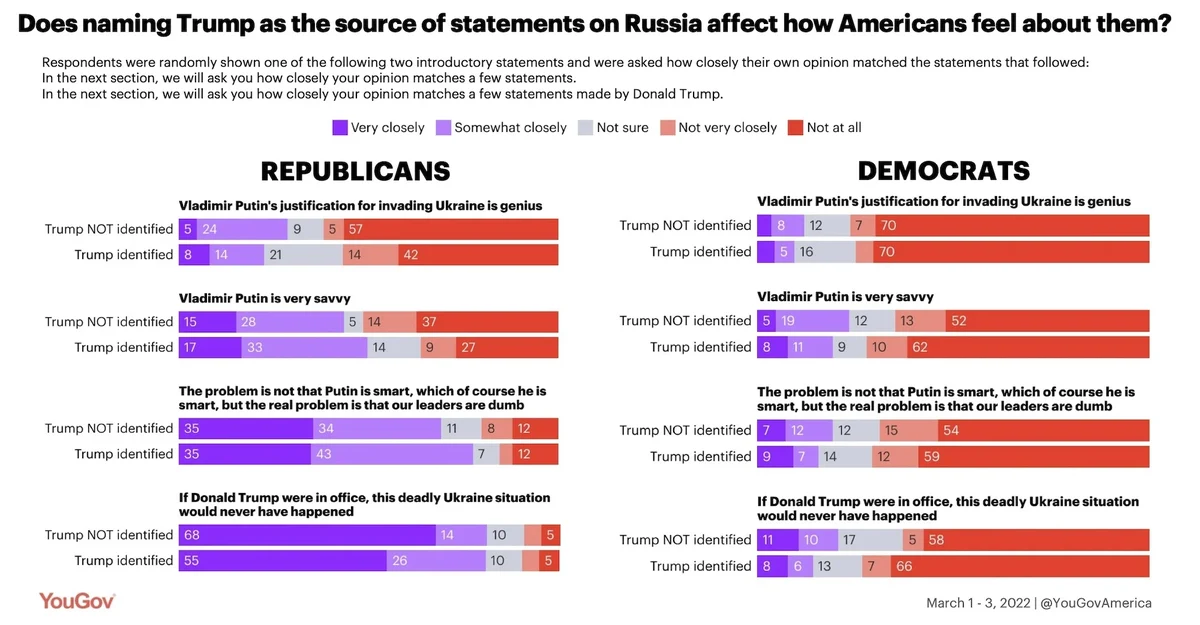In the days following Russia’s invasion of Ukraine, Donald Trump praised Putin as “savvy” and called Putin’s justification for invading Ukraine “genius.” These statements were condemned by politicians on both sides of the aisle, and our recent polling suggests that very few Americans - Democrats or Republicans - consider Putin to be a genius. Moreover, the latest Economist/YouGov Poll asked Americans whether it was appropriate or inappropriate for U.S. leaders to praise Vladimir Putin. Only 10% of Americans — including 9% of Democrats and 13% of Republicans — said it was appropriate, while 67% said it was not.
However, as past research has shown, the political opinions of American citizens are often influenced by cues from party elites. To test this theory in the present context, we presented 1,000 Americans with four statements recently made by Trump about Russian President Vladimir Putin and his invasion of Ukraine. Survey takers were randomly assigned to one of two groups: one half were asked their opinions on these statements without attributing them to Trump and the other half were explicitly told that the statements were made by Trump.

Consistent with these expectations, we find that Republicans are significantly less likely (15 percentage points) to disagree with the statement that “Vladimir Putin’s justification for invading Ukraine is genius” when it is attributed to Trump than when it is not: 57% of Republicans say this does “not at all” match their opinion when it is not attributed to Trump, compared to 42% who say so when it is attributed to Trump. Most of the difference comes from people being more likely to say they are unsure when Trump is cited as the source: 21%, compared to 9% when Trump is not identified.
A similar pattern emerges for the statement “Vladimir Putin is very savvy”: Republicans are 10 percentage points less likely to say this does “not at all” match their opinion when the statement is attributed to Trump than when it is not.
This pattern reverses for the statement, “If Donald Trump were in office, this deadly Ukraine situation never would have happened.” Republicans are more likely to say this “very closely” matches their opinion when it is not attributed to Trump than when it is. Perhaps this is because praise is less persuasive when it comes from the subject of the praise than from others.
Democrats are highly united in repudiating the idea that Putin’s justification for invasion was “genius” and identifying Trump as the source of this statement has no effect on their opinions. They are, however, somewhat more likely (10 percentage points) to say that the statement “Putin is very savvy” does not at all match their opinions when it is attributed to Trump, compared to when it isn’t. They are also slightly more likely (8 percentage points) to disagree that Trump would’ve been able to prevent the Ukraine situation when Trump is identified as the source of this statement.
While there's some effect on opinion from knowing Trump said these statements, it's not enormous or in the same direction for all statements. That could mean that people's opinions on Russia and Putin are already pretty firm. Or it could mean that whether Trump is named or not, he is closely associated with the views he has expressed recently about the conflict.
See the toplines and crosstabs for this U.S. News Poll
Methodology: This U.S. News survey was conducted by YouGov using a nationally representative sample of 1,000 U.S. adult citizens interviewed online between March 1 and March 3, 2022. This sample was weighted according to gender, age, race, and education based on the 2018 American Community Survey, conducted by the U.S. Census Bureau, as well as 2016 and 2020 Presidential votes (or non-votes). Respondents were selected from YouGov’s opt-in panel to be representative of all U.S. citizens. The margin of error is approximately 3% for the entire sample.
Image: Getty










